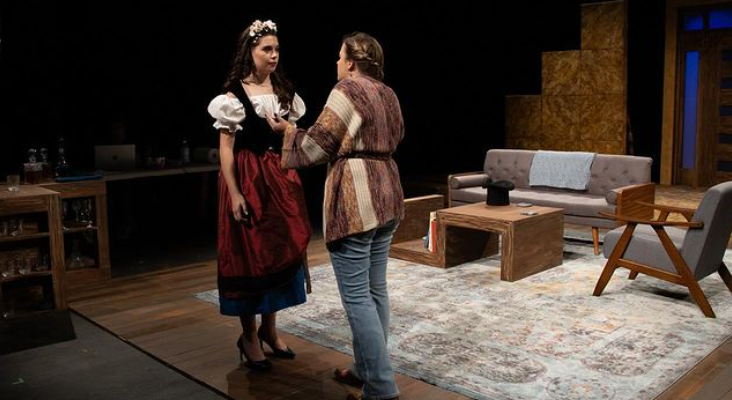From Theatre Fairfield comes another outstanding production: “Dollhouse”. This modern retelling of Henrik Isben’s play, “A Doll’s House” ran in the black box theater from Oct. 17 to Oct. 21 and featured incredible cast members, a gorgeous set and an informative talk-back after the show conducted by Fairfield English Department’s Dr. Emily Orlando. and Dr. Shannon Kelley.
“Dollhouse,” by Broadway’s most published female playwright, Theresa Rebeck, tells the story of a woman, Nora, as a figure from her past comes back to dig up past events. Nora is comfortable in her marriage to Evan, played by Angelo Corsini ‘25, but it is all based on lies. When Evan was sick, she turned to an old friend, Niel Fitzpatrick to help her embezzle money from her dying father. Now Fitzpatrick is back and ready to expose her secret. Being the modern retelling of Isben’s original play, there are some small changes from Isben’s original script, but the same messages are conveyed.
The lead role of Nora was played brilliantly by Katharine Gutkoski ‘26. Nora is such a complex character, a housewife who feels obligated to stay in her marriage, yet is not quite happy. As her past with Fitzpatrick is sprung upon her, we see her struggle with the decision to keep it a secret from her husband, or to let it out. We see her struggle to choose whether she should stay with her husband, or if she should leave him.
The subtle, and not so subtle, misogynistic actions of Evan’s character (the actions that would prompt Nora to leave her marriage) are demonstrated perfectly in Corsini’s performance on stage. We see her torn when an old friend, Dr. Damian Rank, played by Ben Dressel ‘26 confesses he loves her and tells her he is sick, and dying. Hearing those two things at once, sets Nora up for even more confusion in her feelings.
Nora Jocobi “26 played the role of Christine, Nora’s high school best friend who returns after divorcing her husband in search of a job. Jacobi embodies the complexities of this character masterfully on the stage. The audience could not help but laugh at her sarcastic remarks throughout the script but could also elicit empathy as she detailed her traumatic past with her ex-husband. This “polarizing” nature is what Jacobi describes in the talk-back as one of the most interesting parts of playing Christine’s character.
Similar complexities were demonstrated in the performance of Neil Fitzpatrick by Ryan Carrigan ‘27. While he starts out as the villain, the most hated character for attempting to blackmail Nora, audience members realize throughout the course of the play that he is not as bad as he may seem. Carrigan claims in the talkback that if he can gather this sympathy from the audience for his character, then he is doing his job as an actor.
Perhaps one of the most exciting parts of this production was the audience’s reaction and enthusiasm to the scenes that were played out on the stage. Especially as the love triangle that emerges between Nora, Evan and Dr. Damian Rank (after he professes his love for her), the audience is completely engaged and animated. The black box theater, located in the Regina A. Quick Center for the Arts, is such a small intimate space. The actors explained in the talk-back that they could see each and every person in the audience. They agreed that they love and feed off the audience’s reaction but in such a small theater setting, it can also present some interesting challenges in staying focused and not breaking character.
The talk-back, at the conclusion of the show, directed by Dr. Orlando and Dr. Kelley, demonstrated a lot of the literary references and connections in the work as well as why this play is still relevant to us today. Kelley connects the content of the play to Betty Friedan’s “The Feminine Mystique,” and the idea of women as “eternal children.” In an argument on stage between Nora and Evan, Evan compares his wife to a child.
She is not taken seriously by her husband. She is bending to his every will. And with a lack of financial independence, she finds herself trapped bedding to his will. This is a larger issue that is presented in the work of Friedan as many upper-class married white women, who are not required to work, who are reliant on their husband’s income and who spend their days at home, fall into a state of depression but “Dollhouse” demonstrates a need for women to be taken seriously. And it is the final line that Gutkoski delivers, as Nora leaves Evan, that so powerfully conveys this message: “I will be worth waiting for.”
Congratulations are in order to director Jan Mason, the actors and everyone behind the scenes who made this production such a success. Check out Theatre Fairfield’s website, theatre-fairfield.org, to learn more about their upcoming productions. You will not want to miss a chance to see this incredible group on campus!


Leave a Reply